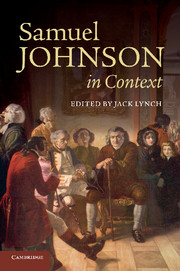Book contents
- Frontmatter
- Contents
- Illustrations
- Contributors
- Preface
- Chronology
- Abbreviations
- Part I Life and works
- Part II Critical fortunes
- Chapter 4 Editions
- Chapter 5 Translations
- Chapter 6 Critical reception to 1900
- Chapter 7 Critical reception since 1900
- Chapter 8 Representations
- Chapter 9 Reputation
- Part III Contexts
- Further reading
- Index
- References
Chapter 6 - Critical reception to 1900
from Part II - Critical fortunes
Published online by Cambridge University Press: 05 June 2012
- Frontmatter
- Contents
- Illustrations
- Contributors
- Preface
- Chronology
- Abbreviations
- Part I Life and works
- Part II Critical fortunes
- Chapter 4 Editions
- Chapter 5 Translations
- Chapter 6 Critical reception to 1900
- Chapter 7 Critical reception since 1900
- Chapter 8 Representations
- Chapter 9 Reputation
- Part III Contexts
- Further reading
- Index
- References
Summary
Respo′nse. n.s. [responsum, Lat.]
1. An answer.
The oracles, which had before flourished, began to droop, and from giving responses in verse, descended to prose, and within a while were utterly silenced. Hammond.
Samuel Johnson, one of the earliest professional critics of literature, was writing at a time when literary criticism as a discipline was still in its infancy. The history of his early critical reception must therefore take account of a diverse range of published responses. Even once we move from the eighteenth century into the nineteenth, a period that witnessed the institutionalizing of English literature, it is important to register not only the high intellectual tradition of responses to Johnson, but also his significance within more popular cultural contexts. Still the most comprehensive list of early responses to Johnson, James L. Clifford and Donald J. Greene’s indispensable Samuel Johnson: A Survey and Bibliography of Critical Studies (1970), admits in its introduction that it would be impossible to list “every discussion of Johnson.” Quite so: and yet critical work on the Romantic and Victorian periods in recent years has discovered unexpected new arenas of response to Johnson.
Public property
“Long before his death on 13 December 1784, Samuel Johnson was public property,” observe Robert E. Kelley and O M Brack, Jr., tapping into a rich vein of economic metaphor which often appears in discussions of Johnson’s significance. Beginning with the Rambler essays in 1750–2, Johnson’s publications always generated discussion, and his private and social life soon became a topic of equal, if not surpassing, curiosity. James T. Boulton, compiler of the invaluable anthology of early responses, Johnson: The Critical Heritage (1971), observes that Johnson “was constantly before the public: whether to acclaim or admonish, a succession of reviews, pamphlets, and books kept him there.” Helen Louise McGuffie’s checklist of Johnson’s appearances during his lifetime in British newspapers and magazines testifies abundantly to his celebrity status (and to his marketability for the publishing industry). Johnson himself appears to have relished his controversial standing, doubtless aware that, for a man who made a living through writing, there was no such thing as bad publicity: “It is advantageous to an authour, that his book should be attacked as well as praised. Fame is a shuttlecock. If it be struck only at one end of the room, it will soon fall to the ground. To keep it up, it must be struck at both ends” (Boswell, Life, 5:400).
- Type
- Chapter
- Information
- Samuel Johnson in Context , pp. 45 - 53Publisher: Cambridge University PressPrint publication year: 2011

